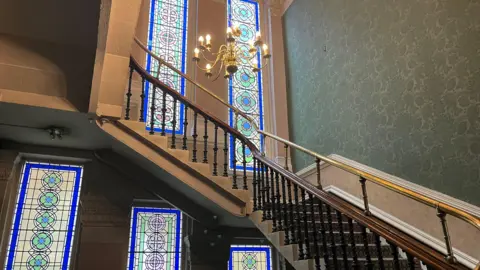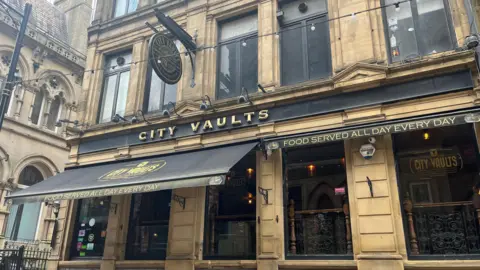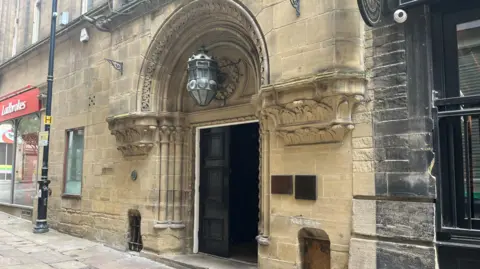'Our club served city's great and good for 260 years'
 BBC
BBCIt was in the 1860s that the Bradford Club opened in a city that teemed with commerce and industry.
This week this venerable institution, which counts Sir Titus Salt and Sir Ken Morrison among its past members, closed its doors for the final time.
The decision, taking after patronage declined since the demise of the Bradford wool trade, brought the curtain down on one of the last Victorian gentleman's clubs to still exist in a provincial city.
Until the closure of the nearby Wool Exchange in the 1970s, the dining room would throng with mill owners and managers on weekdays, while magistrates and solicitors debated in corners. Business deals were sealed over a game of billiards.
The club itself was founded in 1761 before settling in its final premises on Piece Hall Yard.
Fixtures and fittings have been stripped out ahead of a new chapter in the Grade II-listed building's history.
The BBC bumped into trustee Steven Howard on Piece Hall Yard as final preparations for departure were being made.
"It's a great shame," he said.
"Sadly, after many, many years of being here, we're having to close because what we do here is no longer fashionable."
Mr Howard added: "We were still getting by as of Covid, but people's habits changed and not temporarily.
"Many of our overheads were hugely affected by the war in Ukraine.
"For instance, our power costs went through the roof.
"Our model just became redundant really."

The membership had become elderly and many were no longer living in Bradford. The number of professionals working in the city centre had declined since law and accountancy firms left for Leeds.
Some of the furniture has been donated to a Halifax-based charity that will send chairs and tables to schools in the Gambia.
The building has been bought by the owners of the adjacent City Vaults pub and will become a hospitality venue.
 John Dewhirst
John DewhirstSi Cunningham is the chair of Bradford Civic Society as well as the City Centre Heritage Action Zone.
He said: "I think there's a couple of things that have made the site particularly special.
"The first one and perhaps the most important one is the building itself.
"It's a very architecturally striking building.
"It's a bit of a hidden gem for the city as well, because it's located down quite a quiet street in the city centre and has really strong links to Lockwood and Mawson, who are very well-known Bradford architects.
"So the building itself helps to tell the story of Bradford, particularly those links to the industry.
"And I think as far as the club is concerned, that's the part of the city's heritage that probably has quite a lot of fascinating stories and a lot of links to some of the big names from Bradford's wool industry who would have been members there over the years as well."

Dr David Pendleton is the current editor of the Bradford Antiquarian, which is the journal of the Bradford Historical and Antiquarian Society.
He often visited the Bradford Club with the society.
"It'll be sorely missed, but in some respects, I'm astonished it's got this far," Dr Pendleton said.
The Leeds Club, which had a similar history, closed its doors in 2017.
One of the few clubs still going in Yorkshire is the Harrogate Club, which has been in existence since 1857.
But Bradford once had the most private members' clubs outside of London, with five establishments.
Dr Pendleton said: "There were some very rich members whose names have disappeared from history.
"But people like Sir Titus Salt, and the father of the composer Frederick Delius, who owned a big warehouse in Little Germany.
"Names that we still remember to this day were members of that club and undoubtedly it would have had a lot of famous visitors as well over the years."

But as the years went on, the club had to look to other ways of generating income.
It was used as a filming location for the 2013 BBC drama The Great Train Robbery, as well as The ABC Murders and recent production Virdee.
As far as Dr Pendleton is concerned, he is glad it is being kept in local hands.
"It's pretty good news that the people from the City Vaults have bought the building because they've got a decent track record of reviving, and doing a good job actually, of some of the city centre buildings," he said.
But Mr Howard is still reticent about whether the club's history will be kept alive.
"I'm not sure how much of it can be preserved if we're not here," he said.
"We were more interested in the club continuing, but it's not been possible.
"Times have changed."
Listen to highlights from West Yorkshire on BBC Sounds, catch up with the latest episode of Look North.
